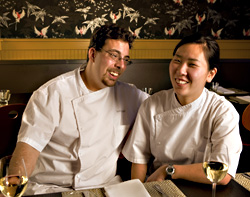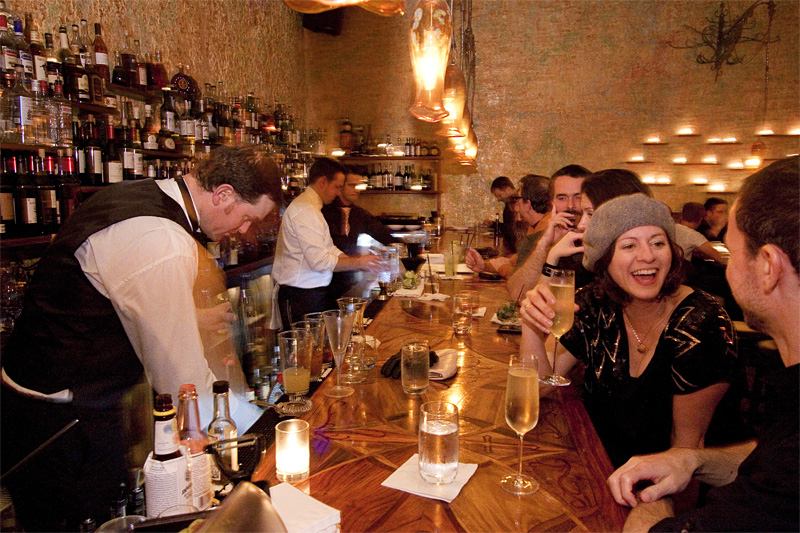You have probably never tasted anything like what Rachel Yang and Seif Chirchi are cooking at Joule, their Wallingford restaurant. Wait, let me claim that statement: I have never tasted anything like what Rachel Yang and Seif Chirchi are cooking at Joule. I have never tasted ant eggs, Panamanian cuisine, or Jean-Georges Vongerichten’s four-star food either, though I can foresee a day when I might. But I never would have expected to ever try an appetizer like black beans and pulled pork stewed together with ginger and miso, and capped with melting cheese—let alone to like the dish.
It’s too improbable a combination, and I’m not even sure if I can parse out all of the culinary references. But the pork and the ginger, the creamy beans, and the lightly sweet soybean paste came together in a soothing, almost homey dish. Even the bread basket turned out to be a bowl of steamed buns that had been deep-fried and coated in a mixture of salt and Chinese mustard. A few of the flavors were so unfamiliar that I couldn’t identify them until I talked to the chefs.
Yang and Chirchi are taking on cuisine sans frontières, and using four-star French technique to make it hold together. The couple, who are married, met in New York while working for Alain Ducasse, a chef with more Michelin stars on his résumé than the Big and Little Dippers combined. Last fall, Tom Hurley brought the couple out to Seattle (Yang as chef, her then-fiancé as sous-chef) to run the kitchen at Coupage, his restaurant in Madrona.
Coupage is where I first marveled over Yang’s East-West combinations. But the entire kitchen crew left in the spring, and despite Hurley’s declarations to me at the time that he was an expert in Korean cuisine, Coupage’s current menu shows that its influence on the food has waned.
Meanwhile, Chirchi and Yang decided to stay in Seattle, and took over a space plum in the middle of Wallingford’s 45th Street commercial strip. They signed a lease in October and opened in November, reformulating their menu so it was, in Yang’s words, “more fun, more young, more us.” The storefront restaurant does show signs of being remodeled on a dime. It’s almost a shotgun shack, long and deep, with tables lined up with the banquettes along both walls. With a poured-concrete floor, bare black tables, and a gold-chocolate-gray color scheme, the room is spare on ornamentation. Yang and Chirchi can watch over everything from the open kitchen station, which has a counter where diners can watch them back. That’s the ultimate sign of calm, competent cooks, by the way—no swearing, no tasting things with fingers, no covering up one’s mistakes.
The chefs’ presence in the dining room is one of a few intimate touches in a room that doesn’t lend itself to intimacy. Yet their food is more intimate than it ever was under Hurley. Yang and Chirchi are thinking more modestly—and pricing their food more inexpensively—than they did at Coupage, dispensing with a few elements per plate, serving tiny dishes in little pots rather than on big plates with elaborate garnishes. The menu is divvied up into little dishes and big dishes, which are mostly one meat and one sauce, designed to be eaten with salads or pickles on the side.
The Korean influence is still the strongest. Korean cuisine is some of the world’s gutsiest, and many Westerners consider it too spicy, too garlicky, and too full of weirdly fermented, odorous things. Yang seems determined to tame it with her ultra-formal training. She crisps pork dumplings and showers them with elegant threads of scallion greens and frilly, light-brown crackles of fried pork fat. She coats a fist-sized poussin (basically a tween chicken) with an strong, sweet chili sauce that blackens as the bird cooks on the grill, and pairs it with a sweet, potently bitter, lemon pickle. The sharpest jolts come in the form of East-West pickles—kimchi-style daikon and pear, sweet cucumber and peppers—served in half-pint jars, but most of the rest of the dishes don’t raise a sweat.
Every aspect of Joule’s food shows the chefs’ care. Their branzino, a Mediterranean sea bass, is grilled until its flesh firms up and the skin crackles; then they set a translucent ring of potent black-olive tapenade and pickled green grapes in orbit around it. Their bison hanger steak is grilled to the perfect point between rare and medium-rare, sliced on the bias into even one-half-inch slices, and set on a pool of emerald green chimichurri sauce—and fine shavings of pickled garlic are appointed at just the right frequency to add one sliver to every slice.
This control works best when Yang and Chirchi are using it to check strong flavors, but it can strangle more delicate ones. Two grilled octopus, their blackened tentacles curling up and around their purple heads like art-nouveau flourishes, were accompanied by a Chinese celery pistou (foodie-speak translation: a cheese-free herb pesto). When I dipped a knife into the sauce, the clean, herbaceous flavor of the celery leaves entranced me; when I slathered it on the octopus, it disappeared. I had the same feeling about the buttermilk-olive vinaigrette on a mizuna salad. And desserts, from a warm blue-cheese pastry with a celery-raisin salad to a bowl of tapioca with curry-leaf-scented coconut milk, grapefruit, and cranberries, fluttered so far into the ether that my taste buds couldn’t quite follow them there.
As at Veil and Lampreia, Joule’s food is of the sort I most love engaging, puzzling out its complexities, even when it doesn’t ultimately work for me. Given Joule’s prices, which are half to one-third what these other two restaurants charge, it’s probably the one I’ll return to most to see how its menu evolves.
The restaurant may not be for everyone. When we finished one meal there, a tablemate said, “I just wish the food was anchored in one cuisine, like Italian or French, so I’d know what to expect.” But that was what I loved most about it. I could read the menu description, even study the plate when the waiter set it down. But until I lifted fork to mouth, I had no idea how the food would taste.
Price Check Black beans and pulled pork $8 Pork dumplings $6 Blackened poussin $16 Octopus $13 Branzino $21 Daikon-pear kimchi $3 Tapioca with grapefruit $6






